

La reconnaissance faciale bientôt utilisée en France pour les services publics en ligne ? Algorithms and their unintended consequences for the poor.
IoT. DRONE. IoT. Autonomous arms attacks. Spotify Caught Using Evil Tracking Cookie. Car hacking. Big Data. Fingerprinting through sensor flaws for phone tracking. G smart contact lens project to measure. Finding a stolen iPhone. App genome project. ACLU cellphone logs. Would you like a webcam in your bedrooms and bathrooms broadcasting live. IPrivacy4IT - Clarinette's blog. Update 20/03/2012.

The greatest privacy threat of all: our connected devices. Researchers discover over 170 million exposed IoT devices in major US cities. Researchers have discovered more than 178 million Internet of Things (IoT) devices visible to attackers in the ten largest US cities.
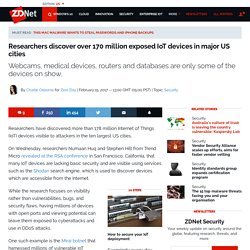
On Wednesday, researchers Numaan Huq and Stephen Hilt from Trend Micro revealed at the RSA conference in San Francisco, California, that many IoT devices are lacking basic security and are visible using services such as the Shodan search engine, which is used to discover devices which are accessible from the Internet. Wearable AI that can detect the tone of a conversation. Delivery.php. It's not just your TV that can track your habits without consent. Can Your 'Smart' Appliances Be Trusted with Your Personal Data? Probably Not... Your fridge is getting so smart, security-software maker Kaspersky Lab thinks you probably shouldn’t trust it.
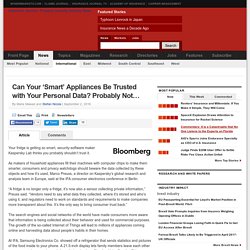
As makers of household appliances fill their machines with computer chips to make them smarter, consumers and privacy watchdogs should beware the data collected by these objects and how it’s used, Marco Preuss, a director on Kaspersky’s global research and analysis team in Europe, said at the IFA consumer electronics conference in Berlin. “A fridge is no longer only a fridge, it’s now also a sensor collecting private information,” Preuss said.
“Vendors need to say what data they collected, where it’s stored and who’s using it, and regulators need to work on standards and requirements to make companies more transparent about this. It’s the only way to bring consumer trust back.” The search engines and social networks of the world have made consumers more aware that information is being collected about their behavior and used for commercial purposes. Artificial intelligence: don't believe the hype. André Bergamin Thanks to neural networks - digital approximations of the way that the human brain learns - artificial intelligence has made enormous breakthroughs in everything from creating machines that can recognise faces with more accuracy than a human, to building cars capable of driving themselves, to recently, a computer "Turing test for sound" which can watch silent videos and predict the sounds that should accompany them.
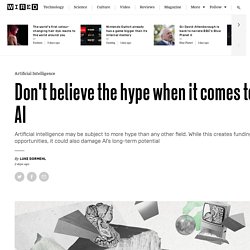
But it very nearly didn't happen like this. Forty years ago, research into neural networks almost stopped altogether. The Internet of Things' Dangerous Future: Bruce Schneier. Last year, on October 21, your digital video recorder — or at least a DVR like yours — knocked Twitter off the internet.
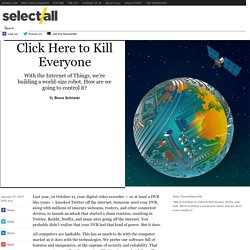
Someone used your DVR, along with millions of insecure webcams, routers, and other connected devices, to launch an attack that started a chain reaction, resulting in Twitter, Reddit, Netflix, and many sites going off the internet. You probably didn’t realize that your DVR had that kind of power. But it does. All computers are hackable. Connected car in the second-hand lot? Don't buy it if you're not hack-savvy. Cars are smart enough to remember an owner, but not smart enough to forget one – and that's a problem if a smart car is sold second-hand.
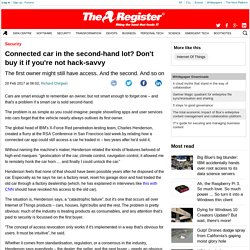
The problem is as simple as you could imagine: people shovelling apps and user services into cars forget that the vehicle nearly always outlives its first owner. The global head of IBM's X-Force Red penetration-testing team, Charles Henderson, created a flurry at the RSA Conference in San Francisco last week by relating how a connected car app could still access a car he traded in – two years after he'd sold it. Without naming the machine's maker, Henderson related the kinds of features beloved of high-end marques: “geolocation of the car, climate control, navigation control, it allowed me to remotely honk the car horn … and finally I could unlock the car.”
Lawyers Ready to Pounce if Companies Forget IoT Privacy. By Joyce E.

Cutler Consumers increasingly tune out privacy risks from internet-connected devices, and companies that don’t take up the privacy torch may be creating liability, attorneys told Bloomberg BNA. Companies offering connected devices, enabling software and applications and other services in the internet of things (IoT) world should take note that class action attorneys are paying attention to the rapidly evolving technology. If companies don’t proactively take on consumer privacy protection, class action attorneys and regulators stand ready to step into the void. The increased attention from the plaintiffs’ bar means that companies, especially those with a consumer-facing front such as Apple Inc. and Alphabet Inc.' Bloomberg Law®, an integrated legal research and business intelligence solution, combines trusted news and analysis with cutting-edge technology to provide legal professionals tools to be proactive advisors.
Class Action Landscape Digital Love-Hate Relationship. How you're tracked digitally all day (and what you can do about it) On the show Devin Coldewey TODAY Aug. 1, 2013 at 9:10 AM ET.
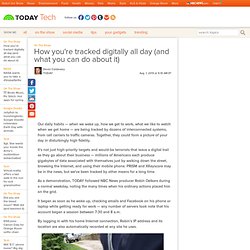
Des chercheurs découvrent une faille pour déverrouiller des millions de véhicules Volkswagen. Des chercheurs de l’université de Birmingham et de l’entreprise allemande Kasper & Oswald ont découvert une faille permettant de déverrouiller à distance des voitures Volkswagen sans posséder leurs clés.

Elle pourrait concerner plus de 100 millions de véhicules, soit la quasi-totalité de ceux vendus par l’entreprise ces vingt dernières années. Dans un article publié cette semaine à l’occasion de la conférence Usenix à Austin consacrée à la sécurité informatique, les quatre chercheurs expliquent comment ils parviennent à intercepter le signal de déverrouillage d’un véhicule et à en cloner le « bip ». Un journaliste allemand de la Süddeutsche Zeitung a pu assister à une démonstration du dispositif. Un matériel accessible L’interception de ce signal nécessite un matériel simple et peu onéreux, puisqu’un une carte électronique Arduino équipée d’un récepteur radio coûte environ 35 dollars.
AI Open Letter - FLI - Future of Life Institute. Artificial intelligence (AI) research has explored a variety of problems and approaches since its inception, but for the last 20 years or so has been focused on the problems surrounding the construction of intelligent agents – systems that perceive and act in some environment.
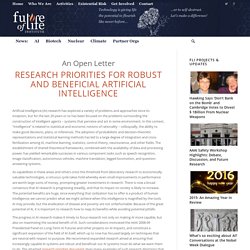
In this context, “intelligence” is related to statistical and economic notions of rationality – colloquially, the ability to make good decisions, plans, or inferences. The adoption of probabilistic and decision-theoretic representations and statistical learning methods has led to a large degree of integration and cross-fertilization among AI, machine learning, statistics, control theory, neuroscience, and other fields.
As capabilities in these areas and others cross the threshold from laboratory research to economically valuable technologies, a virtuous cycle takes hold whereby even small improvements in performance are worth large sums of money, prompting greater investments in research. Smashing Security: Using public Wi-Fi - a Smashing Security splinter. Why online privacy matters — and how to protect yours. As the principal technologist at the American Civil Liberties Union, Christopher Soghoian (TED talk: How to avoid surveillance … with the phone in your pocket) spends much of his time thinking about privacy and surveillance and how individuals can protect themselves from spying.
Recently, he recorded a Facebook Live conversation with his fellow TED Fellow, Will Potter (TED Talk: The secret US prisons you’ve never heard of before), a reporter and author who specializes in covering dissident politics and culture and whose first question to Christopher was: If I don’t have anything to hide, why should I be concerned about privacy or security, anyway? With that, they were off. Christopher Soghoian: I hear this all the time from people, and you know, I think many of us do have something to hide. We may not all be worried about the government, but there are things we may not want our employers or members of our families to know.
Would you suggest covering up the microphone as well?